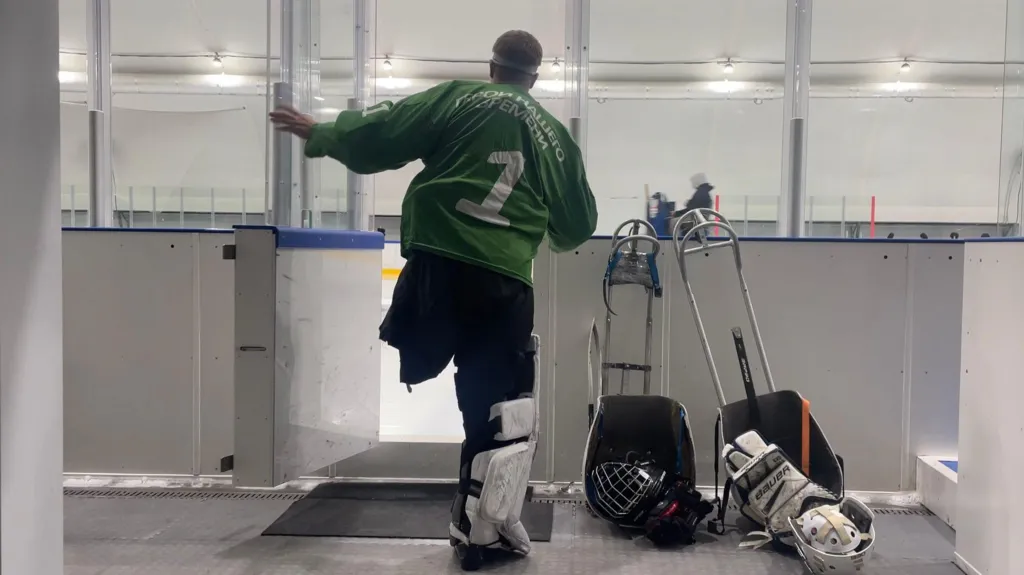
 BBC
BBCAt an ice rink in Vladivostok in Russia's far east, 30-year-old Dmitry Afanasyev is in training with teammates from Soyuz, the local Para ice hockey team.
The players have removed their prosthetic legs and are sitting in specially designed sleds. They're using their hockey sticks to propel themselves around the rink.
Dmitry hopes that one day he'll be a Paralympic ice hockey champion.
Making that happen won't be easy. Russian teams were banned from the last Paralympic Games over the war in Ukraine.
And like all his teammates, Dmitry was on the front line.
"A mine came flying towards me," recalls Dmitry, who was mobilised to fight in Ukraine. "I fell to the ground and could feel my leg burning. I looked down and everything was torn apart. I put on a tourniquet myself and told the guys to drag me out of there.
"My wife's a surgeon. So, I sent her a picture of my leg and she replied: 'They'll probably saw it off.' 'OK,' I said. Whether I have one leg, or two legs. Whatever."
The port city of Vladivostok is more than 4,000 miles from Ukraine and from Russia's capital. This is Asia. The border with North Korea is 80 miles from Vladivostok. China is just 35 miles away.
Yet the consequences of a distant war in Europe are more than visible.
At a cemetery on a hill overlooking Vladivostok there are lines of fresh graves: Russian soldiers killed in Ukraine. In addition to Orthodox Christian crosses, military banners and Russian tricolours mark each plot.
In another section of the cemetery stands a memorial "to the heroes of the Special Military Operation", the official label the Kremlin continues to employ for Russia's war on Ukraine. Here there are more graves of Russian servicemen and the statue of an armed Russian soldier.
"Soldiers live forever," reads the inscription.
On the orders of President Putin, Russian troops poured across the border with Ukraine in February 2022. The full-scale invasion of Russia's neighbour was widely seen as the Kremlin's attempt to force Ukraine back into Moscow's orbit.
More than three and a half years later the war rages on.
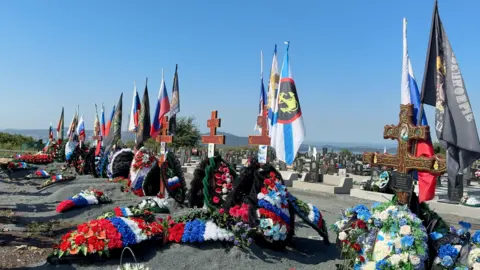
On air I'm often asked: what do the Russian people think about the war in Ukraine, about confrontation with the West, and about President Putin?
"What do Russians think?" is a difficult question to answer.
After all, Russia is so big and varied. The largest country in the world spans two continents and 11 time zones. Some parts of Russia, such as Kursk and Belgorod, border Ukraine.
Other Russian regions, like Primorsky Krai where I am now are a long way from the fighting. Vladivostok is its administrative centre.
This is the furthest I've travelled inside Russia since the start of the war. It's a chance to gauge the mood in a very different part of the country.
"Of course we're worried," Svetlana tells me in a Vladivostok park when I ask her about Ukraine. "This has been going on for years now and we want it to end as soon as possible. We had hoped the Alaska summit [of Donald Trump and Vladimir Putin] would change something. It hasn't.
"People are people. No matter whether they're British or American, Japanese or Ukrainian. I don't know where all the hatred comes from."
I get chatting to Ilya, who claims that war in Ukraine hasn't fundamentally changed his life in Russia.
"You can still earn a living and get by here," Ilya says.
"The standard of living isn't rising, but it's not falling, either. Still, we hope that relations with other countries will improve and that we'll be re-integrated into the global space."
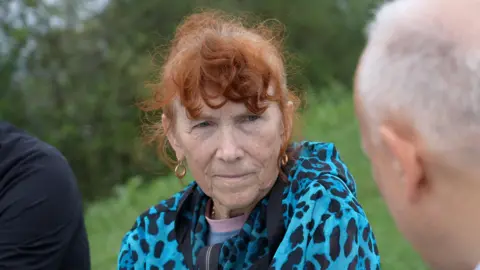
In the centre of Vladivostok I stop to listen to a band busking on a pedestrian street. I'm not alone. A large crowd has gathered to enjoy the improvised rock concert.
Between songs I talk to the lead singer, a young local musician who calls himself Johnny London.
"Do people talk much about what's happening in Ukraine?" I enquire.
"People of my age, we don't usually discuss that stuff. Not very often. I would go as far as to say we never talk about that."
"Why?" I ask.
"We can do nothing about that. It's out of our hands, out of our reach. Hopefully in a couple of years it will get back to normal."
"And what is normal?"
"No war, I guess. That would be nice."
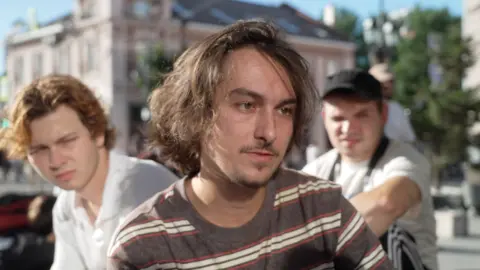
When I finish talking to Johnny London, a pensioner called Viktor walks up. He's recognised me. He saw me on TV last year at a press conference with Vladimir Putin.
"You asked Putin a question, didn't you?" Viktor says. "You're with the BBC."
Viktor's a big fan. Not of the BBC, but of President Putin. He criticises my "provocative question" to the Kremlin leader on the war in Ukraine, he defends Russia's political system and takes aim at the Biden administration over the 2016 US presidential election.
"With the help of mail-in ballots Biden practically stole the election from Trump," Viktor says.
"That's what Trump says," I point out.
"Not only. Putin says it too," retorts Viktor.
"Putin saying it doesn't make it fact," I suggest.
"True," concedes Viktor. "But that's what our people think."
Viktor also thinks that the West is losing power and influence.
"Look what's happening," says Viktor. "This week in China the leaders of India, China and Russia got together, and with many other countries too. But there was no Trump, no Britain, no Germany, no France. India and China alone are three billion people."
On his way back from China Vladimir Putin is stopping off in Vladivostok. Should I get the opportunity to ask the president another question, Viktor suggests it should be about the "new world order".
The city has been preparing for the Kremlin leader's visit and participation in the Eastern Economic Forum. By the side of the road that leads to the venue, street artist Filipp Dulmachenko has used 1,800 cans of aerosol paint to create a most unusual image.
The gigantic mural depicts Vladimir Putin in military fatigues hugging a Siberian tiger.
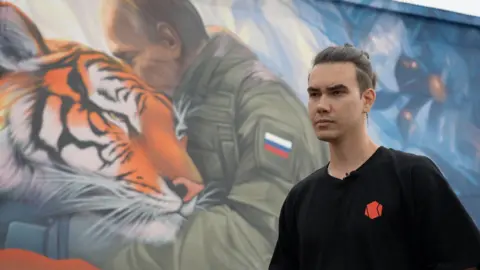
"The Amur tiger has always been a symbol of wildlife," Filipp says. "And Vladimir Putin is a symbol of Russia."
Filipp tells me that when he was a teenager he had run-ins with the police over his street art. But the Putin mural has been officially approved by the regional authorities.
And to accompany the picture the artist has spray-painted a short sentence: a phrase Filipp says is simply about sunrise in the Russian Far East.
Combined, though, with the images of a tiger and of a president who believes he's restoring Russian power, the words seem to take on deeper meaning:
"The dawn starts here."